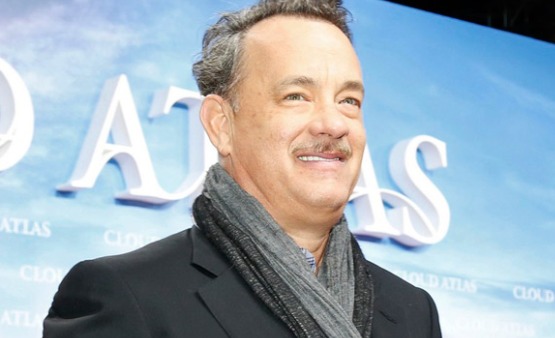Nora Ephron did a lot of things but she didn’t write plays. She did write, with her sister Delia, the omnibus “Love, Loss and What I Wore.” It was spoken, with scripts, by five women who sat on stools and didn’t really have characters or interaction. Nora wrote screenplays, of course, and a funny, funny novel (“Heartburn’), but never a proper two act piece of drama so polished it could just appear on Broadway.
But that’s what “Lucky Guy” is. I did get to see a preview of “Lucky Guy”– which opens on April 1st– on Friday night at the Broadhurst Theater. Tom Hanks, star of Ephron’s two greatest movies– “Sleepless in Seattle” and “You’ve Got Mail”– simply steals the Broadway season as late New York tabloid reporter Mike McAlary. I can’t think of any other movie actor in recent history who makes a Broadway debut like this one. And the playwright: Nothing Nora ever did prepares you for this as her last act, or maybe everything does. All her close friends talk about the perfect little gifts she used to give them. This is one of those gifts.
First of all, the play is unexpectedly greater than just “great.” To think that Ephron wrote this play when she was so ill makes you pause right there. It’s not jokey or constructed of memorable one liners. It’s actually an honest, beautifully wrought tragicomedy about a larger than life guy who burned too brightly. Some of it has been dramatized or condensed from McAlary’s life. But believe me, you get the important stuff.
There’s a person-for-person breathtaking cast that includes Peter Scolari, Maura Tierney, Peter Gerety, and Richard Masur. Then there’s George C. Wolfe, who stages this piece. I can’t get out of my mind at least two scenes where he rises above his already vaunted career highs.
McAlary wrote and reported for the Daily News, the New York Post, and New York Newsday, In the mid 90s, his career turned into a frenzy of headlines — and some were about him. There was still no internet, and the three tabs were in a deathcage match. Editors and reporters went back and forth among the papers as loyalties kept changing. So did the papers’ owners. There was a strike at the News, and then a public showdown at the Post. It was a wild time. At the Intelligencer column in New York magazine, circa 1994-1995, Pat Wechsler and I wrote a lot of stories just about the daily New York media games. A lot of them took place in bars. And at Elaine’s. And it’s all here.
Ephron, who’d worked at the Post in the 70s, and had written for New York, lays all of this out in “Lucky Guy.” I felt like I was watching a hologram of history. And then into this comes McAlary– his successes, failures, his famous car crash, and his cancer. And all those stories, not the least of which was Abner Louima, who was sodomized with a broomstick by rogue cops. McAlary broke that story and won the Pulitzer. And then he died.
Ephron, Hanks and Wolfe really capture what would be the last great hurrah of New York newspapering. This isn’t “The Front Page” and Hanks knows it. Somehow, even though he never knew McAlary, he gets the whole gestalt of what was going on. With his mustache he somehow looks like McAlary on stage.
I don’t know how all the people who will want to see “Lucky Guy” with Hanks will get in there before he’s supposed to leave on May 26. Maybe he’ll extend into the summer. Also Hanks should try and make it past the Tony Awards. With some luck the play will keep going for a while with a replacement. It’s too good not to let it not have a real life in the theater.
And as for Tonys, as much as I love Chris Durang’s “Vanya, Sonia, Masha and Spike,” “Lucky Guy” is headed to Best Drama, Actor, Director, and several supporting acting nods. It’s going to be a bittersweet experience, I imagine, for everyone involved.

